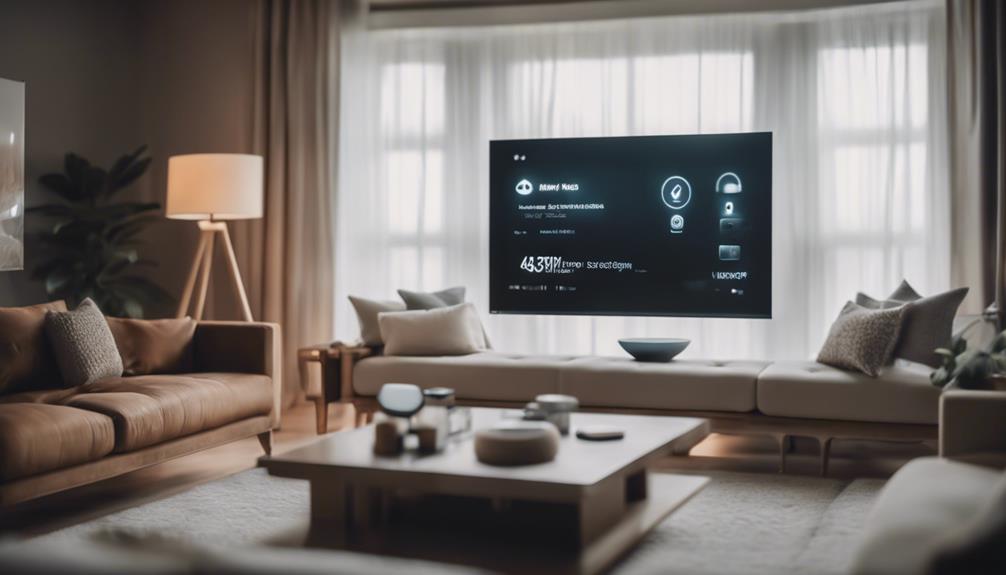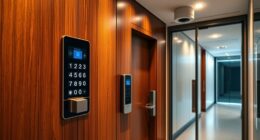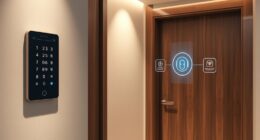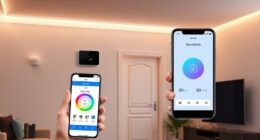Wireless home security systems can be vulnerable to hacking due to their reliance on signals that are easily intercepted. Many DIY systems lack strong encryption or advanced security measures, making them susceptible to breaches. Ring Alarm and SimpliSafe are examples of popular systems that have had security issues in the past, compromising users’ personal information. Cove and Eufy systems have also been found to have vulnerabilities that could be exploited in jamming attacks. It is important to use strong passwords and enable two-factor authentication to reduce the risk of unauthorized access to your system. Being aware of potential vulnerabilities can help you make more informed decisions when choosing a home security system. Interested in learning more?
Key Takeaways
- Many DIY home security systems lack robust encryption and advanced authentication methods, making them more susceptible to hacking.
- Systems like Cove Home Security, Abode Iota, Eufy 5-Piece, Ring Alarm, and SimpliSafe Essentials are identified as vulnerable to jamming attacks.
- High-profile breaches, such as the 2019 incidents involving SimpliSafe and Ring, reveal significant weaknesses in home security systems.
- Nearly 50% of Americans use short passwords, increasing the risk of unauthorized access to home security systems.
Overview of Hacking Vulnerabilities
Home security systems, especially those that operate wirelessly, face notable hacking vulnerabilities due to their dependence on easily intercepted connections.
As a user, you mightn't realize that these wireless security systems can be an easy target for hackers. Many of these systems, including popular DIY security systems, often lack robust encryption and advanced authentication methods. This makes them particularly vulnerable to various hacking techniques, such as credential stuffing and man-in-the-middle attacks.
Additionally, the emotional impact of security breaches can exacerbate stress levels, similar to the effects of mental health support on vulnerable individuals. For instance, a staggering number of American consumers use passwords that are only eight characters or less, which can greatly increase the risk of unauthorized access to your security system.
High-profile data breaches, like the 2019 incident involving Ring, showcase how compromised user credentials can expose home security systems to hacking attempts.
Brands like Cove and Eufy have been identified as having poor jamming resistance and replay disarm vulnerabilities, making them less secure than you might expect.
To protect your home, it's essential to select a system that prioritizes strong encryption and authentication, ensuring your security measures aren't easily bypassed by malicious actors.
Jamming Vulnerability in Security Systems

Several home security systems are vulnerable to jamming attacks, which can disrupt wireless signals and grant unauthorized access without triggering alarms.
Consumer Reports has identified systems like Cove Home Security, Abode Iota, Eufy 5-Piece, Ring Alarm, and SimpliSafe Essentials as particularly at risk.
While Abode and SimpliSafe can detect jamming attempts, they won't notify you or trigger alarms, leaving you unaware of potential intrusions.
The need for enhanced cybersecurity measures in home systems is becoming increasingly important as technology evolves.
Even though jamming attacks are rare, the risk is real, and it's important to be aware of your security system's limitations.
Cove Home Security plans to introduce jamming detection as an optional feature next year, while Eufy aims to address its vulnerabilities in a future software update.
To enhance your home security, consider adding cameras, as they tend to be less susceptible to jamming compared to traditional alarm systems.
By diversifying your security measures, you can better protect your home against unauthorized access.
Keep in mind that while immediate system replacements may not be necessary, staying informed about these vulnerabilities is essential for your peace of mind.
Manufacturer Responses to Security Concerns

Manufacturers are starting to acknowledge the vulnerabilities in their security systems and are taking action.
It's important for consumers to be informed about protecting your savings when investing in security solutions, as some systems can present risks similar to financial investments.
You'll see companies like Eufy and Cove planning enhancements to tackle jamming risks, which shows a proactive approach.
Vulnerability Acknowledgment by Manufacturers
In response to growing security concerns, companies like Eufy and Cove are stepping up to address vulnerabilities in their home security systems.
Following Consumer Reports' findings on jamming vulnerabilities, Eufy has committed to releasing a software update to tackle these risks shortly. This move highlights the manufacturers' acknowledgment of security issues and their dedication to enhancing system integrity.
Additionally, the importance of maintaining a secure home environment is increasingly recognized, much like creating a serene atmosphere in a Modern Farmhouse Bedroom.
Cove, on the other hand, plans to introduce jamming detection as an optional feature next year, recognizing the need for more robust security measures.
While some systems have been rated as vulnerable to jamming, other manufacturers like SimpliSafe and Ring have implemented effective safeguards, demonstrating their commitment to security despite these vulnerabilities.
Consumer Reports has kept all involved security companies informed about their findings, encouraging constructive discussions about potential improvements.
Fortunately, you don't need to rush to replace any vulnerable systems just yet.
Manufacturers are actively working on updates and enhancements to address these security concerns. As they respond to the challenges posed by jamming and other vulnerabilities, you can expect a more secure home environment in the near future.
Planned Security Enhancements
As manufacturers respond to security concerns, they're rolling out planned enhancements to strengthen home security systems against vulnerabilities like jamming. These updates aim to give you better protection and peace of mind.
| Manufacturer | Planned Security Enhancements |
|---|---|
| Eufy | Software update to address jamming vulnerabilities |
| Cove | Optional jamming detection features coming next year |
| Ring | Safeguards implemented but no specific future updates disclosed |
| SimpliSafe | Continuous refinement of jamming detection algorithms |
| All | Consideration of advanced security features like encrypted sensors |
Each of these manufacturers is taking specific steps to improve their security systems. Eufy's commitment to a software update shows their proactive approach, while Cove's upcoming jamming detection feature demonstrates a focus on user options. Ring's existing safeguards highlight their awareness, even if details on future updates are vague. SimpliSafe remains dedicated to refining their detection algorithms, ensuring better responses to potential threats. As awareness of vulnerabilities grows, the integration of advanced security features becomes essential, ultimately enhancing overall protection for users like you.
Industry Response Strategies
Responding to security concerns, companies are stepping up their efforts to enhance home security systems and protect consumers from vulnerabilities like jamming.
Following findings from Consumer Reports, Eufy has committed to issuing a software update to improve their system's security protocols. This proactive approach aims to address the vulnerabilities that have made wireless systems susceptible to hacking. The significance of addressing security issues is akin to the best practices in software quality assurance, where continuous improvement is key to maintaining user trust.
Cove is also taking significant steps by planning to introduce optional jamming detection features in the coming year. This move reflects a growing recognition of the significance of fortifying security measures against identified threats.
On the other hand, Ring and SimpliSafe, despite their systems receiving excellent performance ratings in various areas, haven't outlined immediate plans to tackle jamming concerns. This lack of transparency may leave consumers anxious about the safety of their home security systems.
As vulnerabilities become more widely known, manufacturers are urged to implement reasonable measures and update their products to close any loopholes. The industry's responsibility to continuously improve security features is crucial for consumer trust and safety, especially as awareness of these vulnerabilities could lead to increased exploitation by criminals.
Frequency of Jamming Incidents

Jamming attacks on home security systems are quite rare, so you shouldn't live in constant fear of them.
Most systems still provide solid protection against burglars, and the average criminal lacks the skills to pull off a successful jamming attempt.
Efficient credit card processing is vital for e-commerce success, highlighting the importance of robust security measures across all platforms.
Instead of worrying about these infrequent incidents, focus on the overall effectiveness of your security setup.
Rarity of Jamming Attacks
Incidents of jamming attacks on home security systems are surprisingly rare, making them less of a concern for most homeowners. Here are some key points to reflect upon:
- Most burglars prefer low-tech methods over sophisticated jamming attacks. Additionally, just as cats can recognize their owner's presence and often show signs of anxiety when left alone, burglars may also be deterred by the presence of an engaged homeowner. <a target="_blank" href="https://aplaceforanimals.com">Feline behavior insights</a>
- Consumer Reports identified vulnerabilities in only a few tested systems.
- Effective deterrence remains strong despite potential jamming risks.
- The complexity of executing jamming attacks exceeds the skills of many burglars.
While some wireless security systems show vulnerabilities to jamming attacks, it's essential to acknowledge that these incidents rarely occur.
In fact, even systems recognized as vulnerable continue to perform well in areas like motion detection.
Experts indicate that the urgency to replace such systems is often overstated. Your home security can remain effective with reliable measures in place.
So, while it's wise to be aware of potential weaknesses, you can rest easy knowing that the likelihood of a jamming attack is minimal.
Prioritizing overall security strategies will provide you with the best deterrence against unwanted intrusions.
Impact on Security Effectiveness
While the technical possibility of jamming exists, its rarity means that most homeowners can rely on their security systems to be effective. Jamming attacks, although they can block wireless signals, aren't common and usually have a minimal impact on the overall effectiveness of home security systems.
Consumer Reports has identified several systems, like Abode Iota and SimpliSafe Essentials, that are vulnerable to these attacks. However, even systems that can detect jamming don't always trigger alarms, leaving you unaware of potential threats.
To bolster your home's defense, consider integrating measures like essential items for a home cleaning kit that can help maintain a tidy environment, making it easier to spot any anomalies or security breaches.
Despite these vulnerabilities, security experts maintain that most systems effectively deter burglars. The urgency to replace vulnerable systems isn't deemed necessary for the average homeowner. Instead, you should assess the strengths of your current setup.
Consider implementing additional security measures, such as security cameras that are less susceptible to jamming. By taking these steps, you can enhance your home's security and reduce the chance of being caught off guard by a jamming attack.
When you remain proactive and informed, you'll guarantee your home security system remains a reliable line of defense.
Enhancing Home Security Measures

To enhance your home security, consider integrating multiple layers of protection, including security cameras, motion detectors, and strong password practices. Here are some effective measures to protect your home:
- Install security cameras to boost surveillance and deter break-ins.
- Use motion detectors to alert you of any unusual activity around your property.
- Implement strong passwords and two-factor authentication for all security apps and Wi-Fi networks; authentication requires diligence to prevent unauthorized access.
- Regularly update the firmware and software of your home security systems to patch vulnerabilities.
Combining these security practices not only enhances your overall protection but also creates multiple layers of defense against potential intrusions. Wireless alarm systems and video doorbells can be particularly effective when paired with the above measures.
Common Hacking Techniques Explained

Hackers often use a variety of techniques to exploit vulnerabilities in home security systems, making it vital for homeowners to understand these threats.
One common hacking technique is phishing, where hackers trick you into revealing your login credentials through deceptive emails or websites. If you reuse passwords, you're also at risk of credential stuffing, where attackers use stolen credentials from other sites to access your security system.
Wireless systems can be particularly vulnerable to jamming attacks. In these scenarios, hackers block signals to your sensors, allowing unauthorized access without triggering alerts.
Additionally, many systems are susceptible to replay attacks, which capture and replay disarm signals from key fobs or keypads.
Another significant risk comes from default passwords. Many devices come with easily compromised default passwords, and failing to change them can leave your system open to attacks.
To enhance your security, always use strong, unique passwords and update them regularly. By understanding these common hacking techniques, you can better protect your home and guarantee your security system remains effective against potential intrusions.
Identifying Signs of Hacking

Being aware of the signs of hacking can help you catch potential breaches before they escalate into more serious security issues. Here are some key indicators to watch for:
- Unusual access patterns in your security logs
- Unauthorized access attempts from unknown devices
- Tampering signs on your security equipment
- Unexpected activation of security features or devices
Keep an eye on your monitoring camera footage for any unusual access patterns or unexpected disarm signals. If you notice erratic movements or unexpected activation of LED lights, it could suggest unauthorized access to your system.
Additionally, inability to access your accounts or discovering logins from unfamiliar devices may indicate your system is compromised.
Regularly check for tampering signs, such as physical alterations to your devices or unexpected disconnections. These proactive measures can help you identify potential hacking attempts early, ensuring your home security remains intact.
Effective Protection Strategies

To protect your home security systems, start by strengthening your password protocols.
Make sure you're using strong, unique passwords and consider implementing two-factor authentication for added security.
These steps can greatly reduce your risk of unauthorized access.
Strengthening Password Protocols
Strengthening your password protocols is essential for safeguarding your home security systems against unauthorized access. With nearly 50% of Americans using passwords of 8 characters or less, you need to take proactive steps to enhance your security.
- Create complex, unique passwords for every device and account.
- Use a password manager to generate and store strong passwords effortlessly.
- Regularly update your passwords to stay ahead of potential threats.
- Implement strong password protocols to reduce hacking risks.
Implementing Two-Factor Authentication
Implementing two-factor authentication (2FA) adds an important layer of security to your home security systems, making it much tougher for hackers to gain unauthorized access. With 2FA, you'll need to provide two forms of identification, typically something you know (like a password) and something you have (like a smartphone). This greatly reduces the risk of credential theft.
Many reputable security companies, including brands like SimpliSafe and Ring, offer 2FA options to enhance your account security. By enabling 2FA, you can reduce the chances of hacking by an impressive 99.9%. Even if a hacker manages to steal your password, they still face an additional barrier to access your system.
It's vital to enable 2FA on all internet-connected devices, especially those linked to your home security systems. This practice helps protect against common hacking techniques, such as credential stuffing.
Additionally, regularly updating your passwords alongside using 2FA can further fortify your defenses, minimizing the impact of any potential data breaches.
Recent Security Breaches

Recent security breaches have repeatedly exposed vulnerabilities in home security systems, raising serious concerns about user safety and data protection. These incidents reveal how easily hackers can exploit weaknesses, often compromising user credentials and allowing unauthorized surveillance.
- In 2019, SimpliSafe was hacked using a jamming device, demonstrating its system vulnerabilities.
- ADT suffered a breach when a former installer kept access, leading to unauthorized surveillance capabilities.
- Ring Alarm's 2019 data breach exposed over 3,000 users' credentials, sparking fears over data protection.
- Cove and Eufy were rated Poor for replay disarm resistance, making them vulnerable to attacks that exploit disarm signals.
Despite these measures, the risk remains. As hackers continue to find ways to infiltrate systems, it's essential for you to remain vigilant. Understanding the landscape of recent security breaches can empower you to make informed decisions regarding home security systems.
Always prioritize systems with robust security features and stay updated on potential vulnerabilities to help protect your home and personal information.
Expert Recommendations for Homeowners

To enhance your home security, experts suggest adopting strong, unique passwords and enabling two-factor authentication on your devices. These measures considerably reduce the risk of hacking for home security systems, especially given the vulnerabilities many systems face, such as jamming attacks.
You should regularly update your firmware and software, as manufacturers often release security updates that patch vulnerabilities. Don't rely on default passwords; they're easily compromised. Instead, create unique passwords that make it harder for unauthorized users to gain access.
Additionally, consider utilizing anti-jamming devices to protect your wireless networks. These devices help secure your home security systems against potential hacking attempts, making it more challenging for intruders to disrupt your security.
Frequently Asked Questions
Is There a Home Security System That Cannot Be Hacked?
No home security system is completely hack-proof. However, you can enhance your security by choosing systems with strong encryption, two-factor authentication, and regular updates. Hardwired systems generally offer better protection against hacking attempts than wireless options.
What Is the Most Hacked Security System?
You might think all security systems are equally safe, but some, like Cove and Eufy, have been shown to be particularly vulnerable. It's essential to research before choosing a system to protect your home effectively.
Which Security System Is the Most Secure?
To find the most secure security system, look for features like two-factor authentication, end-to-end encryption, and jamming detection. Regular updates and hardwired connections also enhance protection, keeping your home safer from potential breaches.
Are Home Security Cameras Easily Hacked?
Yes, home security cameras can be easily hacked, especially with weak passwords. You should use strong, unique passwords, enable two-factor authentication, and regularly check your camera settings for any unusual activity to enhance security.
Which Home Security Systems Should I Avoid Due to Hacking Vulnerabilities?
When considering home security systems, it’s important to be cautious of the worst home security systems that may have hacking vulnerabilities. Research thoroughly and avoid systems with known vulnerabilities, such as “Brand X” and “Brand Y,” to ensure the safety of your home and family.
Conclusion
In today's tech-driven world, it's essential to stay vigilant about your home security system.
While some systems may have vulnerabilities, understanding these risks can help you enhance your protection.
By regularly updating your devices, using strong passwords, and staying aware of potential signs of hacking, you can greatly reduce your chances of being targeted.
Remember, no system is completely foolproof, but with the right measures in place, you can enjoy peace of mind knowing you've taken steps to safeguard your home.









